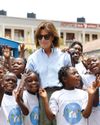Prøve GULL - Gratis
A Waste Of Time
Forbes Africa
|April - May 2022
Plastic rarely gets recycled, ending up in landfills and our seas. From waste-reclaimers to waste-preneurs laboriously upcycling all kinds of material, will the circular economy become mainstream before we choke up our oceans and the planet with immutable rubbish?

Did you know that there are five Debris islands – just waste – in our seas worldwide?
For example, there is an entire floating island of trash, The Great Pacific Garbage Patch, somewhere in the North Pacific Ocean, now greater in size than South Africa, at 1.6 million square kilometers.
And how not?
Only 9% of polymer ever gets recycled, the UN Environment Program reports, so this is not surprising. After disposal, plastic gets exposed to water, sunlight, wind, and various elements causing it to degrade into smaller particles, or ‘microplastics’, a word thought to be used first in Africa by Ryan & Moloney in their research on South African beaches in 1990.
So how is Africa doing in this regard?
Greenpeace says out of 54 African countries, 34 have either passed a law outlawing plastics with implementation, or passed a law with the intention of implementation. Of those, 16 have totally banned carrier bags or have done so partly, without yet introducing regulations to enforce the restrictions.
The East African state Eritrea was the first to embrace an outright sanction on plastic bags in 2005. The outstanding achievers though are Kenya and Rwanda. Importing, manufacturing or selling single-use plastic bags could earn companies a fine of $40,000, while using one could see individuals fined a whopping $500 in Kenya. In Rwanda, a national ban in 2008 on non-biodegradable plastic bags was instituted, prohibiting the making, use, import and sale of bags.
Denne historien er fra April - May 2022-utgaven av Forbes Africa.
Abonner på Magzter GOLD for å få tilgang til tusenvis av kuraterte premiumhistorier og over 9000 magasiner og aviser.
Allerede abonnent? Logg på
FLERE HISTORIER FRA Forbes Africa
Forbes Africa
AI: A LADDER TO PROGRESS OR A TRAP OF DIVISION? THE CHOICE IS OURS
Artificial intelligence (AI) is not a neutral force. It is an amplifier. It can magnify our brightest innovations or our darkest biases. It can serve as a ladder for human development or a trap that widens inequality. The path it takes is not pre-programmed by algorithms; it will be determined by the choices we make about trust, capability, and cooperation.
3 mins
October - November 2025

Forbes Africa
Lady Mary Dinah: The Philanthropist Redefining Wealth And Purpose On A Global Scale
Lady Mary Dinah, officially the Lady of Ellington, is a distinguished food and nutrition expert, humanitarian, and philanthropist reshaping global aid and advancing food security, especially within Africa's most vulnerable regions. Through Mary Dinah Foundation and pioneering initiatives such as the Maternal and Newborn Fund, she is bridging the gap between innovation and community impact.
2 mins
October - November 2025

Forbes Africa
Red Socks Golf Day Rallies Support For Ronald McDonald House Charities
The annual Red Socks Golf Day, hosted in partnership with McDonald's South Africa suppliers, took place in Johannesburg on August 28, raising significant funds for the continued operation of Ronald McDonald House Charities (RMHC) South Africa. This longstanding event highlights the power of collaboration and shared purpose, ensuring that families can find comfort and support during their most difficult times. RMHC South Africa is an independent nonprofit organization governed by a Board of Directors and operated by dedicated staff and volunteers. Its mission is to create, find, and support programs that directly improve the health and well-being of children and their families.
2 mins
October - November 2025

Forbes Africa
Unleashing The Potential Of Every Child: Committing To Sustainable And Transformative Philanthropy
Founded in 1963 by Princess Grace of Monaco and now chaired by H.R.H. Princess Caroline of Hanover, AMADE-Association Mondiale des Amis de l'Enfance (World Association of Children's Friends)-defends an ambitious and deeply human vision: a world where every child, regardless of their social, religious, or cultural background, can live with dignity, in safety, and with respect for their fundamental rights, and become an actor in their own life.
2 mins
October - November 2025
Forbes Africa
AFRICA'S TECH GROWTH NEEDS MORE THAN VCS-IT NEEDS CORPORATES
At the AWS Summit in Johannesburg in August, I sat down with Christophe Viarnaud, founder of AfricArena, to unpack the state of African tech. Few know the terrain better: his platform runs summits across four continents and publishes one of the most widely-read reports on venture capital in Africa.
2 mins
October - November 2025

Forbes Africa
REEF RELIEF
AFTER THE WORLD-FIRST BLUE BOND IN 2018, EFFORTS ARE NOW UNDERWAY IN THE ISLAND NATION OF SEYCHELLES TO RESTORE BLEACHED REEFS AND SUSTAIN ITS BLUE ECONOMY.
3 mins
October - November 2025
Forbes Africa
Redefining Startup Growth In Africa
Across Africa, startups often ignite with promise but stumble in execution. One emerging company believes it has developed the infrastructure needed to change the odds.
3 mins
October - November 2025

Forbes Africa
The True Purpose: Building Futures
IT'S TIME TO SHIFT THE LANDSCAPE. WHAT IF WE FOCUSED GLOBAL FOOD AID AND PHILANTHROPY ON PROVIDING THE NUTRITION ESSENTIAL TO A CHILD IN THE FIRST 1,000 DAYS? THE IMPACT COULD BE TRANSFORMATIONAL.
2 mins
October - November 2025

Forbes Africa
RUGBY, ROOTS AND RESPONSIBILITY
MEET THE RISING GLOBAL RUGBY LEAGUE TALENT MAKING CAMEROON PROUD.
2 mins
October - November 2025
Forbes Africa
UBUNTU IN ACTION: BRIDGING TRADITION AND INNOVATION FOR COMMUNITY EMPOWERMENT
Although the word is derived from southern African Nguni languages, the concept of Ubuntu finds roots across Africa. Of course, while there are direct translations, Ubuntu really represents an ethic of interdependence, where the flourishing of the individual and the wellbeing of the community are seen as mutually reinforcing rather than opposed. In advocating for what he refers to as 'Ubuntu Stoicism', Tiisetso Maloma argues: \"Ubuntu signals a sense of personal responsibility. The community benefits from the virtues of responsible individuals. They also serve as inspiration to others, particularly the younger generation.\" From the perspective of an academic and head of an institution, there is a distinct connection to be made with the very pursuit of academia.
2 mins
October - November 2025
Translate
Change font size

